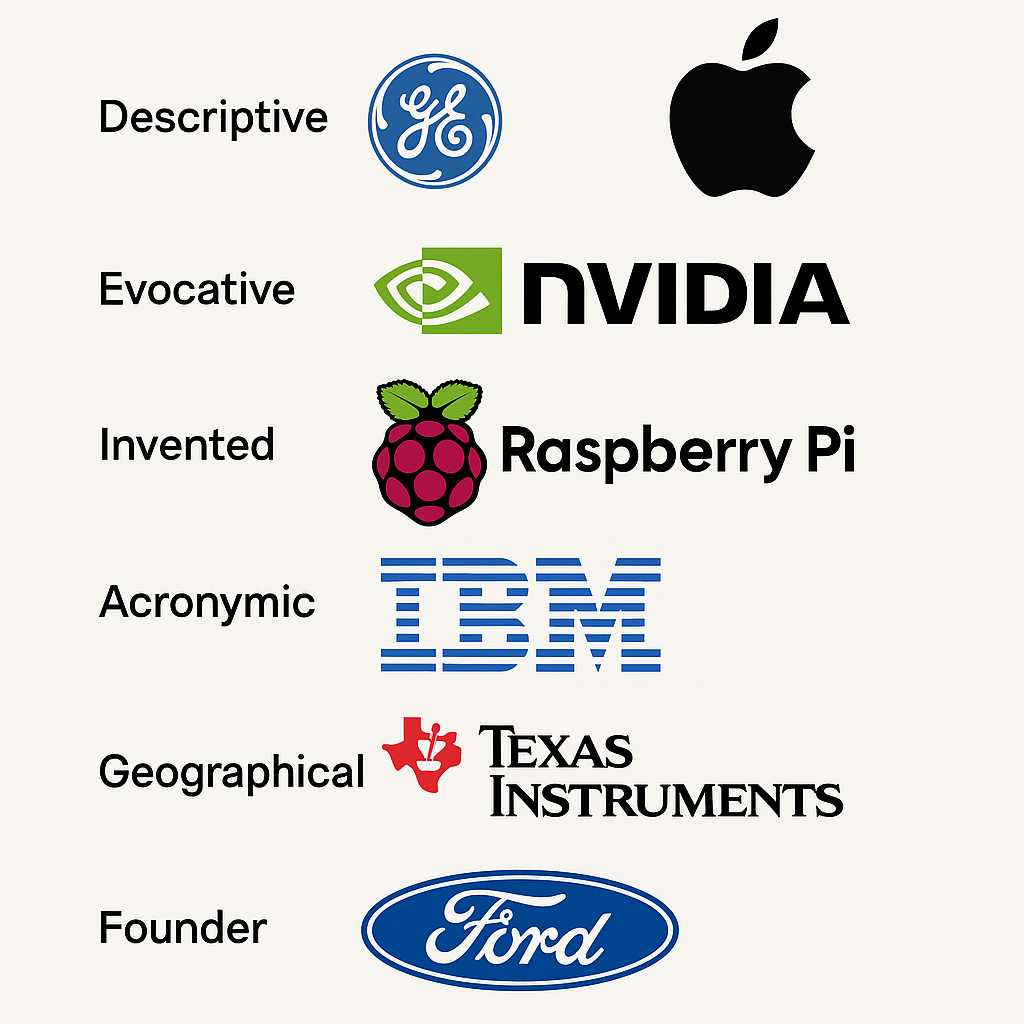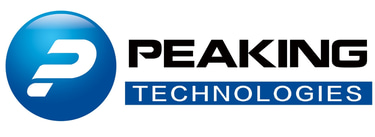Naming Your Hardware Startup: A Strategic Guide to Brand Name Types
In the competitive landscape of hardware startups, a compelling brand name is more than just a label—it's a strategic asset that can influence customer perception, market positioning, and long-term success. Choosing the right type of brand name is crucial, as it sets the tone for your brand identity and can impact everything from marketing effectiveness to legal considerations.
5/21/20254 min read


In the competitive landscape of hardware startups, a compelling brand name is more than just a label—it's a strategic asset that can influence customer perception, market positioning, and long-term success. Choosing the right type of brand name is crucial, as it sets the tone for your brand identity and can impact everything from marketing effectiveness to legal considerations. This guide explores various types of brand names, providing insights and examples to help hardware startups make informed naming decisions.
1. Descriptive Brand Names
Descriptive brand names clearly convey the nature of the business or the products offered. They are straightforward and leave little ambiguity about what the company does.
Examples: General Motors, Toys R Us, Whole Foods.
Pros:
Immediate clarity about the business offering.
Useful for SEO and discoverability.
Cons:
Often lack uniqueness and can be challenging to trademark.
May limit brand expansion into new product lines.
Consideration for Hardware Startups: If your startup offers a unique hardware solution, a descriptive name can quickly inform potential customers of your product's purpose. However, ensure that the name is distinctive enough to stand out in the market and is legally protectable.
2. Evocative Brand Names
Evocative names use metaphors or suggestive language to create an emotional connection, often without directly describing the product or service.
Examples: Apple, Amazon, Nike.
Pros:
Fosters a strong emotional bond with consumers.
Allows for broader brand storytelling and positioning.
Cons:
May require more marketing to establish the brand's association with its products.
Potential for ambiguity if not effectively communicated.
Consideration for Hardware Startups: An evocative name can differentiate your brand in a crowded market. Ensure that your branding and marketing strategies effectively convey the connection between the name and your hardware products.
3. Invented Brand Names
Invented or coined names are unique, made-up terms that are often memorable and legally protectable.
Examples: Google, Xerox, Kodak.
Pros:
High potential for uniqueness and trademark availability.
Can become synonymous with the product category over time.
Cons:
May require significant marketing to build brand recognition.
Initial lack of meaning can be a hurdle for consumer understanding.
Consideration for Hardware Startups: If your hardware product is innovative and creates a new category, an invented name can position your brand as a pioneer. Be prepared to invest in marketing to build brand awareness.
4. Lexical Brand Names
Lexical names play with language through puns, alliteration, or creative word combinations to create memorable brand names.
Examples: Dunkin' Donuts, Hubba Bubba, Fruit Loops.
Pros:
Memorable and engaging.
Can convey brand personality effectively.
Cons:
May not be suitable for all industries, especially those requiring a more serious tone.
Risk of appearing gimmicky if not executed well.
Consideration for Hardware Startups: If your brand targets a younger demographic or aims to inject fun into the hardware space, a lexical name can be effective. Ensure that the name aligns with your brand's overall tone and image.


5. Acronymic Brand Names
Acronymic names use the initials of a longer name or phrase, often resulting from mergers or to simplify complex names.
Examples: IBM (International Business Machines), BMW (Bayerische Motoren Werke).
Pros:
Simplifies lengthy or complex names.
Can retain legacy elements in a modernized form.
Cons:
May lack emotional resonance or immediate meaning.
Can be challenging for brand recall if not well-established.
Consideration for Hardware Startups: Unless your startup has a compelling reason, such as a complex original name or a desire to honor a legacy, acronymic names may not be the most effective choice for new hardware brands seeking to establish a strong market presence.
6. Geographical Brand Names
Geographical names tie the brand to a specific location, leveraging the cultural or historical associations of that place.
Examples: New York Life, Arizona Tea, Kentucky Fried Chicken.
Pros:
Can evoke authenticity and heritage.
May appeal to regional pride or identity.
Cons:
May limit brand expansion beyond the named geography.
Potential for confusion if the brand's operations are not confined to the named location.
Consideration for Hardware Startups: If your hardware product is deeply connected to a specific region's identity or craftsmanship, a geographical name can reinforce authenticity. However, consider future scalability and whether the name might constrain expansion into new markets.
7. Founder Brand Names
Founder names use the name of the company's founder(s), often conveying a personal touch and legacy.
Examples: Ford, Kellogg's, Ben & Jerry's.
Pros:
Adds a personal and authentic element to the brand.
Can build trust and credibility.
Cons:
May not convey the nature of the products or services.
Potential limitations if the founder's reputation changes.
Consideration for Hardware Startups: If the founder has a strong personal brand or industry recognition, using their name can lend credibility. Ensure that the brand narrative effectively connects the founder's story to the hardware products offered.
Conclusion
Selecting the right type of brand name is a strategic decision that can significantly impact your hardware startup's brand identity and market success. Consider your target audience, brand values, product offerings, and long-term vision when choosing a name. Whether you opt for a descriptive, evocative, invented, lexical, acronymic, geographical, or founder name, ensure that it aligns with your brand strategy and resonates with your intended customers. Remember, a well-chosen name is the first step in building a strong, memorable, and enduring brand.
